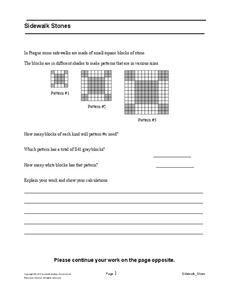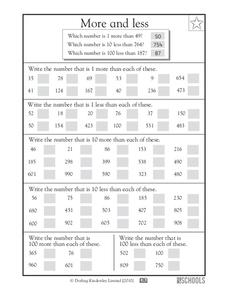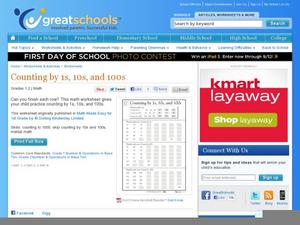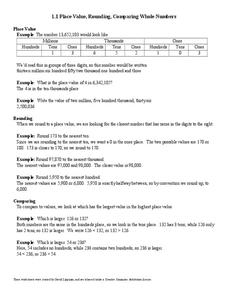Mathematics Assessment Project
Sidewalk Stones
One block, two blocks, white blocks, gray blocks. In the high school assessment task, learners investigate patterns of sidewalk stones to develop a quadratic expression for each colored block. Young mathematicians then use the expression...
Willow Tree
Fibonacci and Other Sequences
Fibonacci is an interesting sequence that forms some unique patterns. Learners explore sequences that do not have the typical arithmetic and geometric patterns. They identify the pattern and find the next consecutive terms....
Curated OER
Frogs Hopping by 2s
Hop to it! Beginning counters fill in water lily number sequences as a frog "hops" across them, skip counting by twos. There are five sequences in total, and some require counting backward. Learners can reference the two examples, which...
Illustrative Mathematics
Kitchen Floor Tiles
An interesting way to look at the kitchen floor is to count the number of tiles in the border. Fred starts with four white floor tiles and writes an expression for the number of tiles needed for the colored border. Algebra learners are...
Curated OER
Missing Numbers to Twenty
Which number is missing? Beginning counters examine twenty-six number sequences, one for each letter of the alphabet. Each sequence has four numbers, ranging from one to 20. There is one number missing from the sequence, and learners...
DK Publishing
3 Times Table
This 25-chart will give mathematicians a chance to detect patterns as they shade in every multiple of three by skip counting. They solve multiplication number sentences involving three and the numbers 1-5 (one is done for them.) Finally,...
Mathematics Assessment Project
Patchwork
Sew up learning on writing rules for patterns with an assessment task that has pupils investigate the number of triangles needed for cushions of different sizes. They then use the data to generate a rule for a cushion of any size.
Curated OER
Counting by 3s, 4s, and 5s
Skip count along the mushrooms to complete these number sentences which give young scholars an introductory look at addition and subtraction. Starting from five double-digit numbers, they subtract or add by threes, fours, and fives to...
Curated OER
Counting Forward or Back
What comes next? Young counters follow the stone path to each house, filling in numbers in a sequence as they go. Some of these move forward and some backward, but all progress by ones. Learners start with given numbers and then follow...
Curated OER
More and Less
Mental mathematicians add and subtract 1, 10, and 100 from sets of numbers. Each set of one, two and three-digit numbers gives scholars a chance to practice their addition and subtraction skills. There are 62 whole numbers in all. What...
Curated OER
Choose the Operation: Plus or minus (up to 100)
Investigate the relationship between addition and subtraction as scholars fill in these number sentences, each of which is missing a symbol. Is it a subtraction or addition equation? There are 20 of these to start, all written...
Curated OER
Spin a Window!
How many windows does this school bus have? If your class is new to counting, this will be a fun way to get them some practice. Cut out and laminate the spinner template and set it up to spin (instructions written out if you need them)....
Curated OER
Counting by 2s, part 2
Two, four, six, eight...can your scholars count by twos? They fill in missing numbers in 18 number sequences, all of which require skip counting by twos. Some begin on an even number and others odd, however all of these are whole...
Balanced Assessment
Telephone Service
Class members must determine the best phone plan for customers. by assessing three different phone plans. Each plan price depends not only the number of minutes, but also the location of the calls — bringing in a third variable. Scholars...
Howard County Schools
To Babysit or Not to Babysit?
Would you work for a penny today? Use this activity to highlight the pattern of increase in an exponential function. Scholars compare two options of being paid: one linear and one exponential. Depending on the number of days worked, they...
Curated OER
Counting by 1s, 10s, and 100s
These sequences are missing numbers and require some skip counting to complete. Scholars finish rows of numbers first counting by 1s, then 10s, and finally 100s. Each has three given numbers to get them started, and they fill in five...
Curated OER
Counting Out Loud
These number sequences are quite fun to look at! Beginning counters complete six of them as they say and write in the numbers. They count only by 1s, however some of these move from greatest to least. The highest number here is 20. Once...
Curated OER
Hopping by 2s
Hop to it! Young counters practice skip counting by two using illustrations of animals hopping from place to place. Each image shows a number sequence and scholars draw in the path as they move from number to number. Encourage them to...
Open Text Book Store
Arithmetic for College Students: Worksheets
Loaded with concepts ranging from multiplying decimals to converting units to solving problems using the order of operations, a thorough practice packet is perfect for a fifth or sixth grade math classroom.
Concord Consortium
Leap Years and Calendars
How many birthdays do leap year babies have in a lifetime? Learners explore the question among others in a lesson focused on different calendar systems. Given explanations of the Julian, Gregorian, and Martian calendars, individuals use...
EngageNY
More on Modeling Relationships with a Line
How do you create a residual plot? Work as a class and in small groups through the activity in order to learn how to build a residual plot. The activity builds upon previous learning on calculating residuals and serves as a precursor to...
Mathematics Assessment Project
Table Tiling
How many total tiles does it take to tile a table top? Learners apply geometric concepts to determine the number of tiles needed for a specific square table top, and then use the result to create expressions for the number of tiles...
Curated OER
Complete the Patterns
In this patterns worksheet, learners look at the each of the patterns in the 5 rows of shapes. In each row, students recognize patterns by filling in the last 2 shapes to complete the pattern in each of the 5 rows.
Curated OER
Function Tables
In this function tables worksheet, students analyze the number patterns in each of 2 tables. Students determine the patterns and fill in the blanks in the table.

























